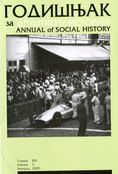Џез је слобода (Џез као америчко пропагандно оружје у Југославији)
Jazz is freedom (Jazz as a weapon of american propaganda in Yugoslavia)
Author(s): Radina VučetićSubject(s): History
Published by: Udruženje za društvenu istoriju
Keywords: jazz; USA propaganda; cold war
Summary/Abstract: Cultural influences as away of cultural diplomacy of the United States were important and powerful instruments of the United States foreign policy as a kind of battle for "hearts and minds" and the battle of ideas which was fought by the variety of United States governmental and non-governmental institutions and instruments. In that cultural Cold War, the United States offered - supreme visual arts, jazz and rock'n'roll, Hollywood production, modern and avant-garde theatre and dance, American literature as well as education. That is the reason why Coca-Cola, rock'n'roll, jeans and American popular culture became powerful weapons in the Cold War. American and British influences in music through jazz and rock'n'roll were the most obvious ways of westernizing Yugoslav society. In the initial post-war years in Yugoslavia, jazz was considered decadent and was not so popular. Then, after 1948, a big historical "no" to the Soviets became a "yes" to jazz. Thanks to the American embassy in Belgrade, Dizzy Gillespie (1956), Louis Armstrong (1959 and 1965), Ella Fitzgerald (in 1961 and in 1964) and other prominent jazz musicians gave concerts in Yugoslavia. On the other hand, Yugoslav jazz developed, with a great number of jazz ensembles, records and with a famous Yugoslav Jazz Festival on Bled. Since the jazz was music of freedom, this music genre, as one of the most popular American cultural products, brought some freedom to the Yugoslav peoples.
Journal: Godišnjak za društvenu istoriju
- Issue Year: XVI/2009
- Issue No: 3
- Page Range: 81-101
- Page Count: 21
- Language: Serbian

